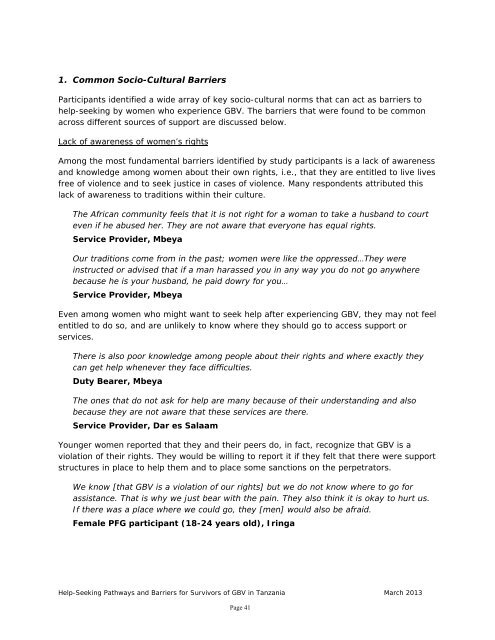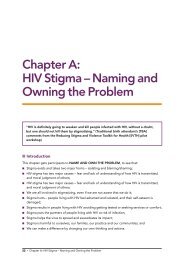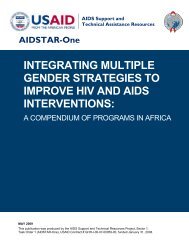Download PDF - ICRW
Download PDF - ICRW
Download PDF - ICRW
You also want an ePaper? Increase the reach of your titles
YUMPU automatically turns print PDFs into web optimized ePapers that Google loves.
1. Common Socio-Cultural Barriers<br />
Participants identified a wide array of key socio-cultural norms that can act as barriers to<br />
help-seeking by women who experience GBV. The barriers that were found to be common<br />
across different sources of support are discussed below.<br />
Lack of awareness of women’s rights<br />
Among the most fundamental barriers identified by study participants is a lack of awareness<br />
and knowledge among women about their own rights, i.e., that they are entitled to live lives<br />
free of violence and to seek justice in cases of violence. Many respondents attributed this<br />
lack of awareness to traditions within their culture.<br />
The African community feels that it is not right for a woman to take a husband to court<br />
even if he abused her. They are not aware that everyone has equal rights.<br />
Service Provider, Mbeya<br />
Our traditions come from in the past; women were like the oppressed…They were<br />
instructed or advised that if a man harassed you in any way you do not go anywhere<br />
because he is your husband, he paid dowry for you…<br />
Service Provider, Mbeya<br />
Even among women who might want to seek help after experiencing GBV, they may not feel<br />
entitled to do so, and are unlikely to know where they should go to access support or<br />
services.<br />
There is also poor knowledge among people about their rights and where exactly they<br />
can get help whenever they face difficulties.<br />
Duty Bearer, Mbeya<br />
The ones that do not ask for help are many because of their understanding and also<br />
because they are not aware that these services are there.<br />
Service Provider, Dar es Salaam<br />
Younger women reported that they and their peers do, in fact, recognize that GBV is a<br />
violation of their rights. They would be willing to report it if they felt that there were support<br />
structures in place to help them and to place some sanctions on the perpetrators.<br />
We know [that GBV is a violation of our rights] but we do not know where to go for<br />
assistance. That is why we just bear with the pain. They also think it is okay to hurt us.<br />
If there was a place where we could go, they [men] would also be afraid.<br />
Female PFG participant (18-24 years old), Iringa<br />
Help-Seeking Pathways and Barriers for Survivors of GBV in Tanzania March 2013<br />
Page 41

















